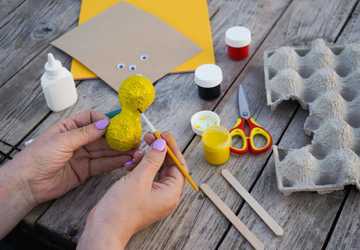8 Easy Tips to Incorporate Mindfulness into Your Daily Routine
Author: Isak Karlsen
Have you ever found yourself lost in a sea of tasks, unable to pause and connect with the present moment? Does the hustle and bustle of modern life often leave you feeling overwhelmed and disconnected.
We all have those days. Our minds are constantly racing, juggling multiple tasks, and we often forget to live in the present.
But why is it crucial to be present? Mindfulness, the act of being fully engaged in the present moment, has been shown to reduce stress, improve focus, and enhance overall well-being.
You deserve a life where every moment counts, where you can find peace amid chaos. This blog post will discuss "8 Easy Tips to Incorporate Mindfulness into Your Daily Routine."
Let's embark on this transformative journey together.
8 Game-Changing Tips for Your Daily Routine
Mindfulness is not a far-fetched concept but a daily practice, a habit that can be easily integrated into your routine. Ready to embark on a transformative journey? Let's dive in.
1.Begin with Breath Awareness
The breath - it's the life force that sustains us and yet is often overlooked in the chaos of daily life. Tuning into your breath is a simple yet potent way to anchor yourself in the present moment.
This practice can act as a reset button, calming the mind, reducing stress, and enhancing focus.

Start by setting aside just 2 minutes each morning. Please close your eyes, take a deep breath, hold it for a moment, and exhale slowly. With each breath, focus solely on the sensation of air entering and leaving your nostrils.
Ensure you're in a comfortable position. Whether seated or lying down, maintain a straight posture. This helps in maximizing the flow of air and keeping you alert.
2.Mindful Eating
We often treat meals as mere tasks on our checklist, eating while working or watching TV. Mindful eating encourages us to fully engage with our food, celebrating the sensory experience of each bite.
This practice not only aids digestion but helps recognize accurate hunger signals and elevates the joy of eating.
Begin with a small meal or even just a snack. Turn off distractions like TV or smartphones. As you eat, focus on your food's colors, textures, and flavors. Chew slowly, relishing every morsel.
Mindful eating is not about following strict dietary rules but being present during meals. It's essential not to judge yourself if your mind wanders; gently bring it back to the feed.
3.Nature Walks
In the age of skyscrapers and digital screens, we sometimes forget our inherent connection with nature. Immersing in nature has lowered stress, boosted mood, and enhanced cognitive function.
Allocate a specific time each week, even if it's just 20 minutes, for a walk in a park, forest, or any natural setting nearby. Please leave your phone behind or keep it on silent. Focus on the sounds, sights, and sensations around you.
The aim isn't fitness, though that's a bonus. It's about immersing yourself in the environment. Avoid the urge to rush; walk at a pace that allows you to observe and feel.
4.Journaling
In our fast-paced lives, moments of reflection are often fleeting. Journaling provides an avenue to pause, reflect, and converse with our innermost thoughts and emotions.
Consistent journaling can foster self-awareness, offer clarity in times of confusion, and serve as a therapeutic outlet for emotions.

Dedicate a few minutes each day or even weekly to write freely. It doesn't have to be structured; pour your feelings, thoughts, and observations onto the paper.
Refrain from stressing about grammar, punctuation, or coherence. This is your space, free of judgment. Write as if no one else will read it because it's only for you.
5.Digital Detox
Our screens often become barriers to genuine presence as the digital world envelops us. Digital detox is the intentional act of disconnecting from electronic devices to reconnect with the immediate world.
Taking breaks from the digital sphere can significantly reduce stress, improve sleep, foster real-life connections, and boost overall well-being.
Designate specific hours or even an entire day where you remain unplugged. Use this time to engage in activities you love – reading, gardening, painting, or daydreaming.
Begin with manageable durations, perhaps an hour or two. Over time, as you see the benefits, you can extend these periods. It's not about shunning technology but balancing its usage.
6.Mindful Listening
Genuine listening has become a rare art in an age of constant chatter. Mindful listening is the conscious effort to be wholly present when someone speaks, hearing beyond just the words.
It strengthens relationships, fosters understanding, and ensures the speaker feels valued and heard.
The next time you engage in a conversation with a colleague, friend, or family member, tune into their words fully. Let go of the urge to formulate responses and immerse yourself in their narrative.
Remember, it's not about passive hearing but active listening. This means being attuned to what is being said and the emotions and nuances behind the words.
7.Body Scan Meditation
Amid the hustle of life, we often neglect the vessel that carries us through it all – our body. Body scan meditation methodically directs attention to different body parts, noting sensations without judgment.
This form of meditation enhances body awareness, releases tension, and anchors the mind in the present moment.
Find a quiet space and lie down comfortably. Starting from your toes, gradually shift your attention through every part of your body, observing sensations like warmth, tension, tingling, or relaxation. Progress slowly, making your way up to the crown of your head.
It's natural for the mind to wander during this practice. If it does, gently bring your attention to the body part you were focusing on.
8.Gratitude Practice
Gratitude practice is a gentle nudge, a reminder to shift our gaze from the empty half of the glass to its brimming counterpart.
Cultivating gratitude boosts our mood, fortifies our resilience, strengthens relationships, and fosters overall happiness.
Every night before bed or at the start of your day, jot down three things you're genuinely grateful for. These don't have to be monumental; even the smallest joys count, like the sun's warmth on your skin or a kind gesture from a stranger.
The beauty of gratitude lies in its authenticity. It's essential to feel what you're grateful for, not just think of them.
Conclusion
Life today is busy, filled with distractions and screens. But with these eight tips, you've seen that being present and mindful isn't out of reach; it starts right now.
Being mindful isn't another task; it's a new way to see and experience life. Each tip helps you enjoy the moment, whether focusing on your breath, tasting your food, or walking.
Mindfulness isn't about being perfect. Some days will be challenging, but that's fine. The important thing is to keep trying and enjoying the moments when you're truly present.
Use these tips to guide you in living a life where you're not just going through the motions but feeling and experiencing everything. Think of mindfulness as a lifelong adventure, helping you thoroughly enjoy every day.





